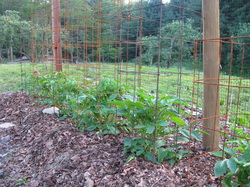MULCH!

Reduce weeding, enrich your soil, maximize your efforts.
Mulch is a covering of matter placed carefully around your plants after your seeds have sprouted or your plants been transplanted. We use what is available and freely provided.
Benefits of mulching:
Mulch is a covering of matter placed carefully around your plants after your seeds have sprouted or your plants been transplanted. We use what is available and freely provided.
- Grass clippings (from lawns that do not use chemical fertilizers or pesticides- you don’t want to be having that stuff in your yard anyway.
- Fall leaves. Compile in composting heaps in your backyard. As they decompose they make a most wonderful substance called leaf mold. This is a very rich soil amendment (additive) that can be added and used like compost. Negative side to leaves is that they can be inhabited by ticks.
- Straw.
- Wood chips. These both help retain soil moisture and break down in time adding value to the soil.
Benefits of mulching:
- Mulch helps maintain moisture in the soil, which means less watering, which saves you time.
- It decomposes, adding more carbon material and nutrients to the soil.
- Encourages worm activity and multiplication. Worms do great things for your soil, such as making worm castings (processing the dirt through their digestive tract creating worm castings which plants love) and aerating the soil.
- Dramatically reduces the amount of time you spend weeding. We all have many important things to do with our time, and the less time we spend weeding, the more time we have available for those other important things.
- A negative side to mulching is that it can hide invasive bugs, slugs, and rodents. In the end, it is a personal choice.
